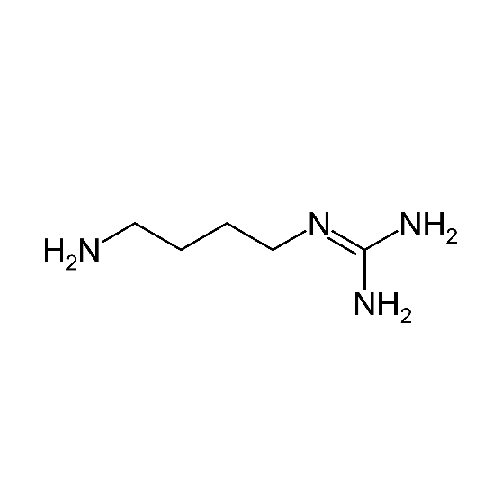
Agmatine
Scientific names: Agmatine
Alternate names: 1-(4-aminobutyl)guanidine, Agmatin, Agmatine Sulfate, Decarboxylated Arginine
Actions: General, Antidepressant, Anti-diabetes, Anti-inflammatory, Anxiolytic, Cardiovascular, Cognitive, Nephroprotective, Neurologic, Opioid
Background
Agmatine is a chemical found in bacteria, plants, and animals, including humans. It's made from the amino acid called arginine.
Agmatine seems to help manage different chemicals and pathways in the brain. This might improve certain conditions of the brain and nervous system.
People use agmatine for alcohol use disorder, Alzheimer disease, anxiety, depression, Parkinson disease, stroke, and many other conditions, but there is no good scientific evidence to support these uses.
Agmatine seems to help manage different chemicals and pathways in the brain. This might improve certain conditions of the brain and nervous system.
People use agmatine for alcohol use disorder, Alzheimer disease, anxiety, depression, Parkinson disease, stroke, and many other conditions, but there is no good scientific evidence to support these uses.
Safety Safety definitions
When taken by mouth: Agmatine is possibly safe when used in doses up to 2.67 grams daily for up to 2 months. Side effects might include diarrhea, indigestion, and nausea.
Surgery: Agmatine might lower blood sugar and blood pressure. This might interfere with blood sugar and blood pressure control during and after surgery. Stop taking agmatine at least 2 weeks before a scheduled surgery.
Special Precautions & Warnings:
Pregnancy and breast-feeding: There isn't enough reliable information to know if agmatine is safe to use when pregnant or breast feeding. Stay on the safe side and avoid use.Surgery: Agmatine might lower blood sugar and blood pressure. This might interfere with blood sugar and blood pressure control during and after surgery. Stop taking agmatine at least 2 weeks before a scheduled surgery.
Effectiveness
Effective Effectiveness definitions
There is interest in using agmatine for a number of purposes, but there isn't enough reliable information to say whether it might be helpful.
Dosing & administration
There isn't enough reliable information to know what an appropriate dose of agmatine might be. Keep in mind that natural products are not always necessarily safe and dosages can be important. Be sure to follow relevant directions on product labels and consult a healthcare professional before using.
Interactions with pharmaceuticals
Medications for diabetes (Antidiabetes drugs)
Interaction Rating=Moderate Be cautious with this combination.
Agmatine might lower blood sugar levels. Taking agmatine along with diabetes medications might cause blood sugar to drop too low. Monitor your blood sugar closely.
Medications for high blood pressure (Antihypertensive drugs)
Interaction Rating=Moderate Be cautious with this combination.
Agmatine might lower blood pressure. Taking agmatine along with medications that lower blood pressure might cause blood pressure to go too low. Monitor your blood pressure closely.
Interactions with herbs & supplements
Herbs and supplements that might lower blood pressure: Agmatine might lower blood pressure. Taking it with other supplements that have the same effect might cause blood pressure to drop too much. Examples of supplements with this effect include andrographis, casein peptides, L-arginine, niacin, and stinging nettle.
Herbs and supplements that might lower blood sugar: Agmatine might lower blood sugar. Taking it with other supplements with similar effects might lower blood sugar too much. Examples of supplements with this effect include aloe, bitter melon, cassia cinnamon, chromium, and prickly pear cactus.
Herbs and supplements that might lower blood sugar: Agmatine might lower blood sugar. Taking it with other supplements with similar effects might lower blood sugar too much. Examples of supplements with this effect include aloe, bitter melon, cassia cinnamon, chromium, and prickly pear cactus.
Interactions with foods
There are no known interactions with foods.
vital.ly has licensed monographs from TRC Healthcare.
This monograph was last reviewed on 08/03/2024 11:00:00 and last updated on 26/11/2020 00:37:47. Monographs are reviewed and/or updated multiple times per month and at least once per year.
Natural Medicines disclaims any responsibility related to medical consequences of using any medical product. Effort is made to ensure that the information contained in this monograph is accurate at the time it was published. Consumers and medical professionals who consult this monograph are cautioned that any medical or product related decision is the sole responsibility of the consumer and/or the health care professional. A legal License Agreement sets limitations on downloading, storing, or printing content from this Database. No reproduction of this monograph or any content from this Database is permitted without written permission from the publisher. It is unlawful to download, store, or distribute content from this site.




